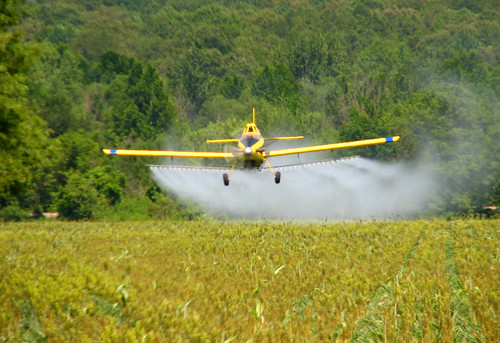October 2011
 |
| Crop dusting in the US Photo by Roger Smith on Flickr |
These warnings were largely dismissed as scare-mongering.
However, now even the press in Monsanto's home ground is reporting on what's happening in Roundup Ready fields, and it's not good news.
Over the past 15 years, Roundup herbicide has become a ubiquitous product on American farms. The rise in its use has coincided with unprecedented crop yields and profits for farmers, plus minimal effort and outlay. Roundup and Roundup Ready crops have also helped propel Monsanto to the world's most dominant seed producer, and ominously have blocked research and development into new herbicides and non-GM crop varieties.
The predicted Roundup-resistant weeds are now a reality: reliance on Roundup and Roundup Ready crops has led to an 'explosion' of weeds genetically evolved to withstand the weed-killer over an estimated 11 million acres. Such weeds spread fast through seeds and pollen, and are more vigorous than their non-evolved cousins. In some cotton-growing areas, weeds four inches around the stems and growing a a rate of several inches a day are taking over fields. Roundup-resistant weeds starve crops of sunlight, water and nutrients, clog farm machinery, and choke irrigation ditches so badly that water can't pass through. To date 21 weed-species have evolved to resist the herbicide, up from none in 1995, and the list is growing by one to two species per year.
The farmers' solution was, first, to spray ever-more Roundup, then to add other ever-more toxic herbicides to the mix. This year, in some areas agri-chemical dealers have run out of 'Cobra', the herbicide of choice to use in tandem with Roundup. None of these cocktails have been tested for safety.
As chemical tactics fail, farmers resort to hiring itinerant workers to hand-cut and hand-pull the weeds.
Farmers' next problem may be financial. So far, commodity prices have been high enough to justify an extra $30 per acre for labour and $10 to $20 an acre for pre-emergent herbicide treatments. If crop prices drop, the farmers will be sunk.
Monsanto's solution has been to shore up its Roundup Ready crops by slashing prices, offering farmers rebates and even by giving them incentives to buy competitors' herbicides. It's also trying to get a new GM-herbicide package, based on Dicamba instead of Roundup to market. Rival company, Dow AgroSciences, has sniffed out a marketing opportunity and is introducing its own package based on 'Enlist' herbicide. In a situation where noxious weeds resistant to three or four herbicides already abound in some areas, dicamba-resistant or Enlist-resistant GM crops are unlikely to be more than a stay-of-execution.
If the US government seems to be washing its hands of the problem, that may be because it has already taken 'remedial' action. It has passed a requirement for labels which urge farmers to use other herbicides in conjunction with Roundup. This 'suggestion' is tucked away in the small-print in a 54-page instruction booklet, which farmers don't have time to read.
The super-weed problem has not been high-profile in the US because biotech industry is firmly in the driving seat of the PR. As one weed scientist put it “Most of the public doesn't know because the industry is calling the shots on how this should be spun.”
In answer to the question 'are they running out of options?', a weed scientist said “The simple answer is yes”, or as a dealer put it “They're using about every bullet in their gun”.
OUR COMMENT
This is another fine example of the US government paradigm for GM 'regulation' based on “co-existence and co-operation” (see US FIG-LEAF 'REGULATIONS' – October 2011).
With appropriate laws in place limiting herbicide use, it would have been possible to preserve competition in the seed and herbicide market, maintain adequate seed and herbicide R&D, and easily deal with safety considerations. As it is, farmers and ocnsumers will be the end-losers in their government's rule-free game.
Nature's response to a man-made agri-ecology based on single dominant seeds and single dominant chemicals, has been to fill the fields with single dominant plants of its own design. While human guns have a limited supply of ammunition, Nature's arsenal is infinite.
We have two options: we can stagger from biotech-led crisis to crisis, until our food supply implodes, or, we can move to modern, sustainable, locally-adapted techniques of food production.
If you don't mind the former, buy GM. If you would prefer the latter, use your votes, your voice and your purse to get it.
SOURCES
- Georgina Gustin, Resistant weeds leave farmers desperate, St Louis Today, 17.07.11
- Carey Gillam, Super weeds pose growing threat to US crops, Reuters, 29.09.11
No comments:
Post a Comment
Thanks for your comment. All comments are moderated before they are published.